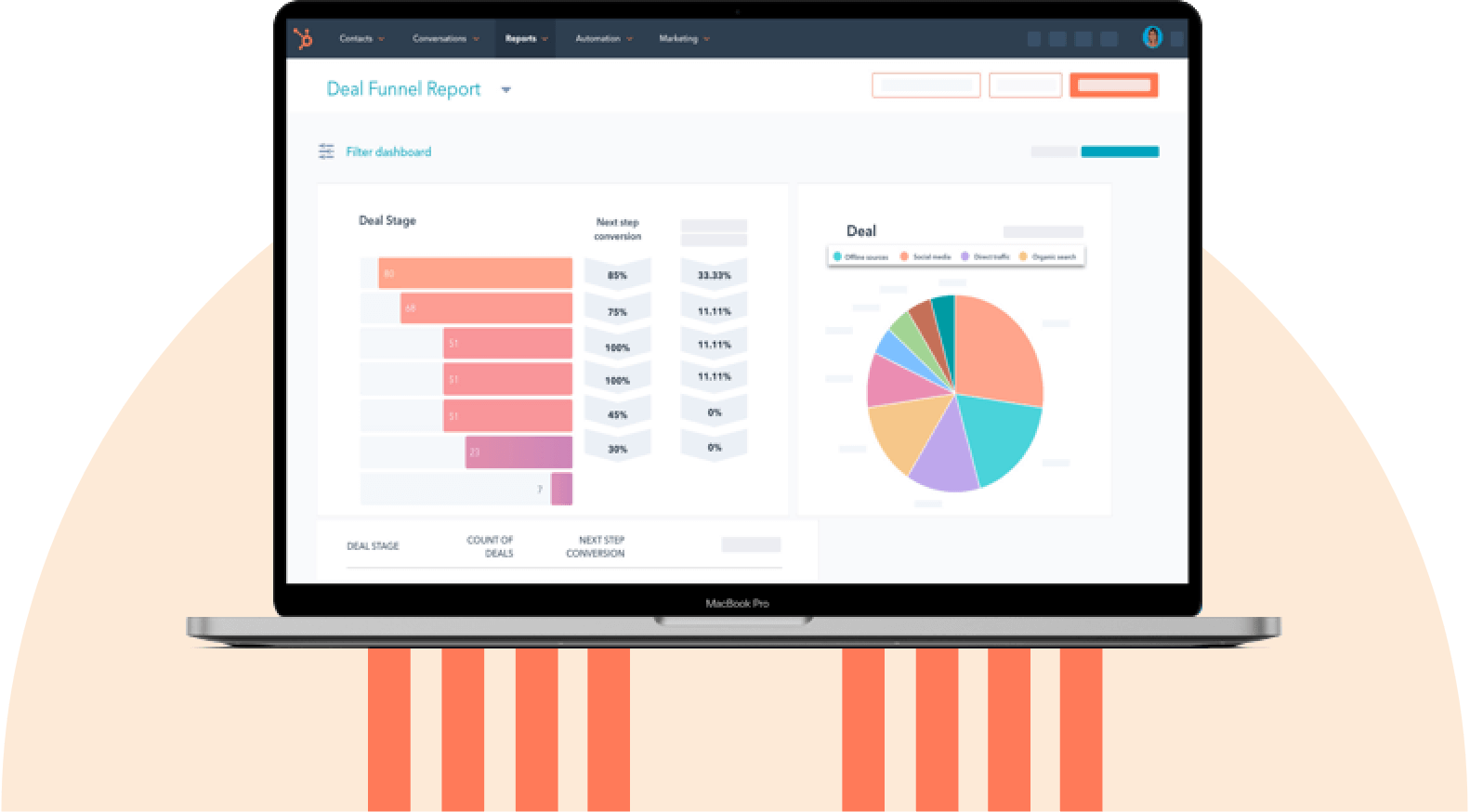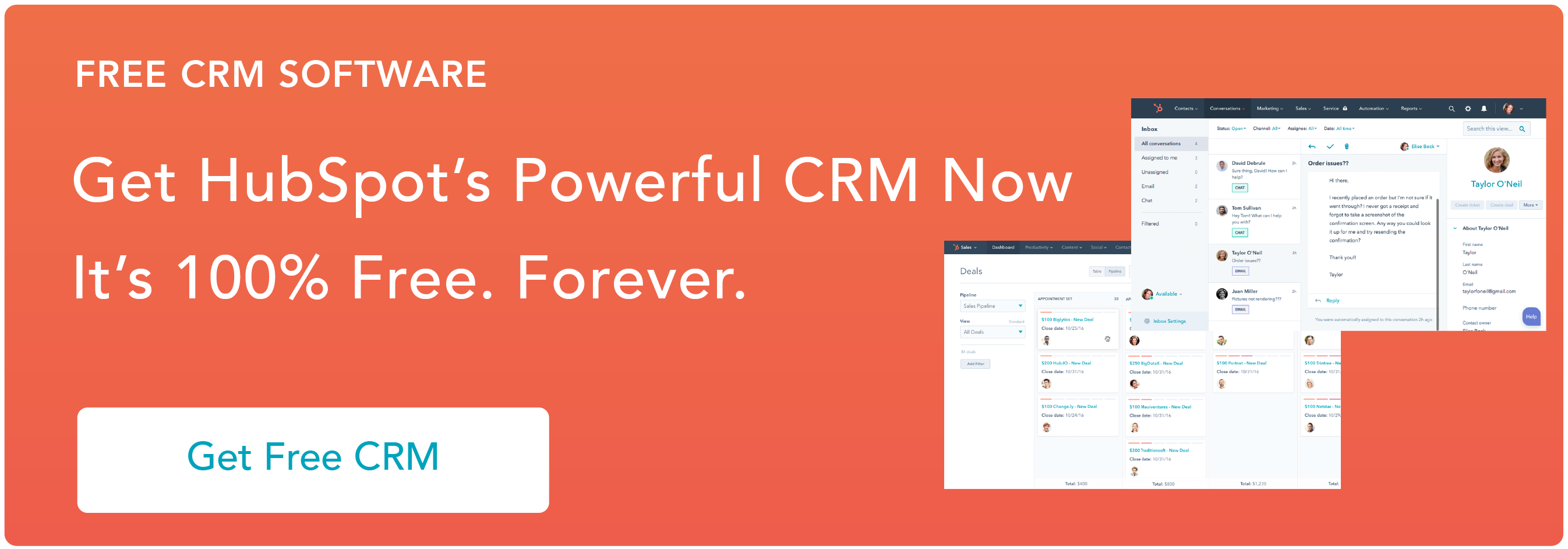Although some technology has proven to be more useful than others, one piece of sales and marketing technology that’s here to stay is customer relationship management (CRM) software.
There are many benefits to having a properly deployed CRM system. It tracks and manages all interactions and communication your reps have with prospects and customers. It also helps flag opportunities that might require additional nurturing or follow-up (among many other things).
What is a CRM?
A CRM or customer relationship management software allows your business to collect, store, and manage your customers’ data. You can mine this data for insights, use it to forecast future sales, and automate your marketing and sales processes.
When you choose the right CRM for your industry, business type, reps, and customers, it's simple to reap the many benefits of this software.
In this guide, we'll review the major benefits you can bring your sales organization by incorporating a CRM.

HubSpot's Free CRM Software
Free CRM Software & Tools for Your Whole Team
- Sales
- Marketing
- Operations
- Customer Service
CRM Benefits
1. You’ll maintain a centralized database across your organization.
CRMs let your entire organization keep all prospect information — over any duration of time — in a central database. This allows for quick cross-team access as well as the ability to easily manage all information via a shared location.
What we like: Sales reps don’t have to spend time digging through files and records to find the information they need about prospects to follow up and close deals.
2. You’ll know your customers better.
A CRM system gives you a holistic view of every customer because it stores all customer information in one place. This information includes:
- Full name.
- Email address.
- Phone number.
- Website.
- Birthday.
- Job title.
- Social media accounts.
What we like: Having this information makes it easy to personalize your communication with every contact.
3. You can manage all communication and interactions with prospects.
All communication, both internal (rep to rep) and external (rep to prospect), can be managed through a CRM.
For example, your CRM will help a rep determine if and when they need to reach back out to a specific prospect. It will also help your reps remember whether or not they already sent a prospect the resources they requested.
What we like: This allows sales reps to track all parts of the buyer's journey, including every interaction, email, phone call, and more.
4. You can automate data entry.
With a CRM, your team will never have to spend time logging emails, calls, meetings, and interactions — all of this information will be automatically collected and aggregated within the system.
Additionally, a CRM allows reps to update all deals by the stage they're in — then, the system will automatically handle the rest (e.g., weighting, summation, visualization), keeping this process as efficient as possible for everyone involved.
5. You’ll be reminded to follow up with prospects.
A CRM tracks all of your prospect activity, which helps your reps know when they need to follow up with specific prospects. When reps are reminded about specific follow-ups, they're able to schedule their contact when their support is most helpful to a prospect.
What we like: These follow-up reminders help reps increase their chances of converting more leads into customers.
6. You can better organize contact data.
CRMs allow your team to easily keep track of every contact (and their related data), no matter their buyer's journey stage. In fact, reps will be able to see if a contact visited your company website, reached out through live chat, downloaded content from the site, or already spoke with another member of your sales team.
Reps can also log notes from their calls or email interactions with their contacts and leads. The best part? All of this information is always searchable within the CRM.
What we like: CRMs keep information from all of your contacts and leads — making it easy to find, store, and organize.
7. You can segment your customers.
Have you or your reps ever wanted to create a list of contacts to reach out to based on specific criteria? CRMs allow you to sort contacts by data that you've collected over time.
For example, a rep might filter contacts by location, company size, or deal stage. This way, your team members will always maintain a clear idea of how to position outreach for each segment, increasing the probability of conversion.
8. You can create sales reports.
CRMs allow your team to collect and organize data about prospects and deals using reporting features such as sales dashboards. These allow reps to better automate and manage their pipelines, deals, and contacts. They can also evaluate their personal performance, keep track of their goals, and work towards meeting their quotas.
Sales managers can use these sales reports to see how their team is tracking toward quota attainment and review the number of closed deals. VPs and other organization leaders can also monitor the amount of generated revenue using their CRM.
9. You’ll automate forecasting for your sales performance.
The key to any successful sales organization is the ability to plan strategically and make informed decisions. With the CRM reports I just mentioned, you can pull in key metrics like monthly recurring revenue (MRR) and year-over-year (YOY) growth, which make it easier for sales leaders to identify trends and develop performance-related forecasts.
Plus, CRMs allow reps and sales managers to see which activities and sources are the most profitable lead generators for reps.
What we like: This data helps team leaders create sales projections for upcoming months and adjust pipeline estimates as necessary.
10. You’ll scale your sales processes over time.
As mentioned, a CRM will provide your sales team with one place where they can keep track of leads, prospects, and customers over any duration of time. CRMs also allow you to review specific activities like emails, calls, and meetings booked.
What we like: Sales managers can use this data to identify patterns and see which sales processes are working for their team and which ones could be improved — which is how your sales team can use information stored in the CRM to scale your processes as your business grows.

HubSpot's Free CRM Software
Free CRM Software & Tools for Your Whole Team
- Sales
- Marketing
- Operations
- Customer Service
11. You can ensure team communication is facilitated.
CRMs help with effective team communication in every organization. This communication is critical to maintain a positive brand image among all reps who are interacting with prospects as well as ensure reps are learning from each other and working together to reach their quota.
With a CRM, your team can do this by tagging reps and managers members on specific deals they want to bring them onto. Sales leaders and reps can also use the system to reassign specific leads with the click of a button. Lastly, reps don't need to leave the system to write and send emails to team members to have these discussions — instead, all communication can be facilitated easily from within the CRM.
12. You can keep the same software as your company grows.
As your company grows, a CRM will grow with you — that‘s the beauty of this type of software. Whether it’s tracking more leads, organizing more contact information, or recording a greater number of interactions with prospects, CRMs are meant to grow alongside your business.
And this isn't just true for sales and marketing organizations — CRMs can assist other teams within your organization as you grow, too. Examples include customer service and operations — these teams can pull from your prospect information to contact them, personalize content for them, tailor CTAs and product details towards their needs, and more.
13. You’ll see higher customer retention.
Acquiring new customers is expensive.
To keep your costs low, you have to retain your existing customers, and a CRM helps. A CRM helps you keep your customers happy by ensuring you follow up with them, find those who bought your product a while ago, and ask about their general welfare.
What we like: This will help you sustain your customers' interest in your product, improve their loyalty to your brand, and generate sales.
14. You can protect your customers’ data
If you’re collecting customer information from places like the EU, you are legally required to comply with GDPR requirements. Doing this manually is tasking, but using a CRM software that’s GDPR-ready makes your life easier.
A GDPR-ready CRM software can help you:
- Get and document your contacts’ consent to store and use their personal information.
- Automatically notify your new contacts that you’ll be storing their data.
- Manage your customers’ subscription to email communication preferences.
What we like: With a GDPR-ready CRM, you don’t make mistakes when it comes to GDPR and you abide by the law.
15. CRMs make administrative tasks efficient.
All of your administrative tasks — such as manual data entry, hunting for email chains, recording conversations, and saving contact information — will be simplified with the implementation of a CRM.
In fact, a CRM automates a lot of these tasks so your team can spend their time and resources on more impactful tasks. Even though administrative tasks might not directly impact revenue, they impact the schedules of your team members and reduce the time they can spend on leads and prospects.
Grow Better With CRM Software
Using a CRM system will boost productivity among reps, keep all information regarding prospects in a central location, help your team close more deals, and foster important business relationships.
Begin thinking about how you can improve the perception of CRM software among your reps and implement a system to help you boost conversions and positively impact your bottom line.
Editor's Note: This post was originally published in March 2016 and has been updated for comprehensiveness.





![The Importance of a CRM: Why Your Company Needs a CRM to Grow Better [New Data]](https://www.hubspot.com/hubfs/1-Feb-23-2021-12-59-16-65-AM.jpg)




